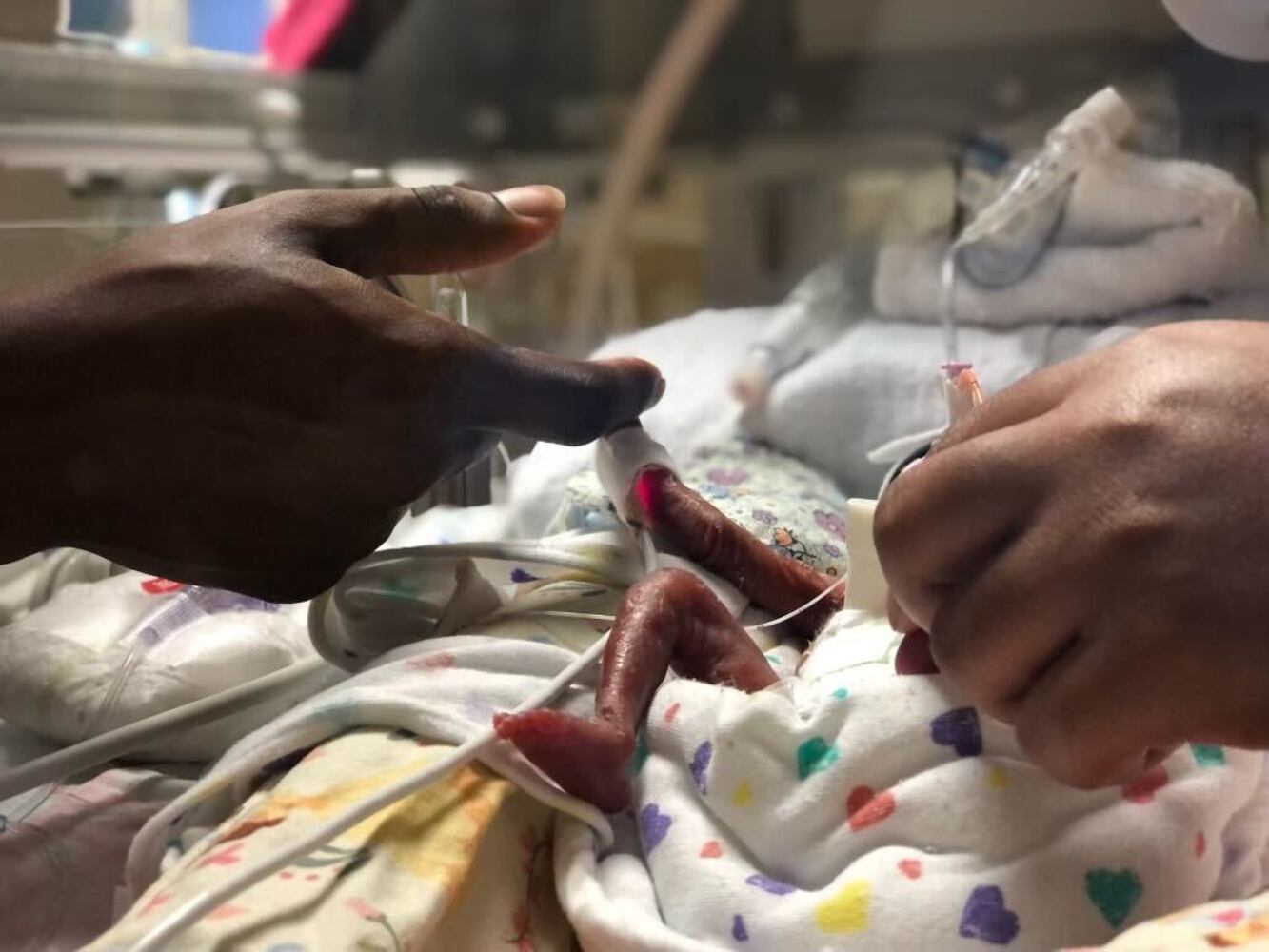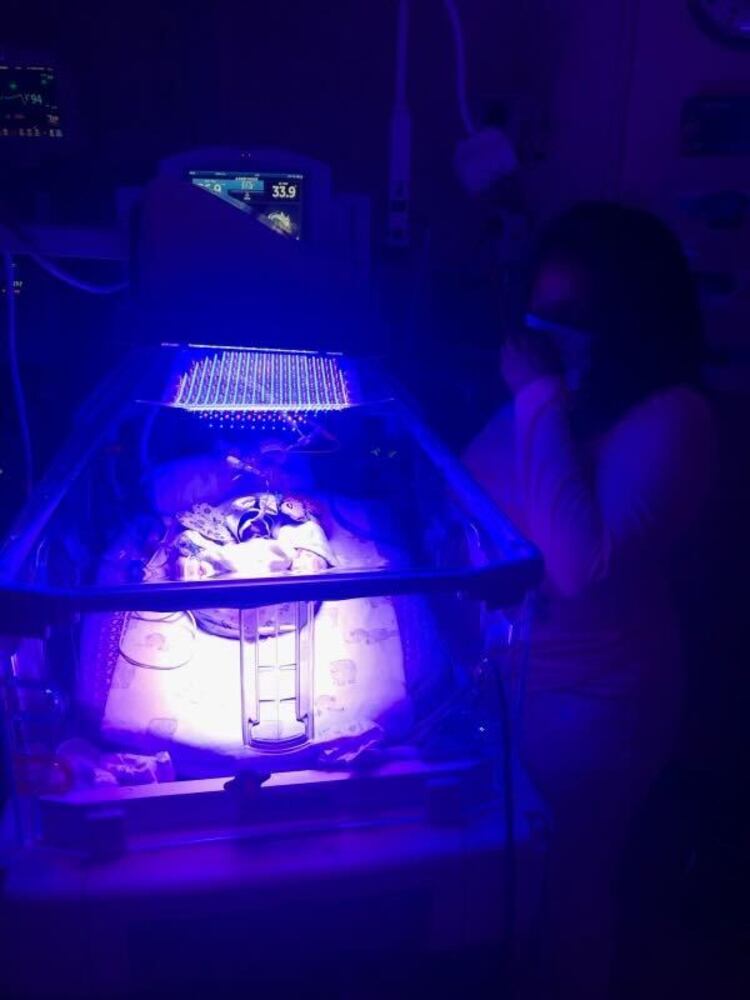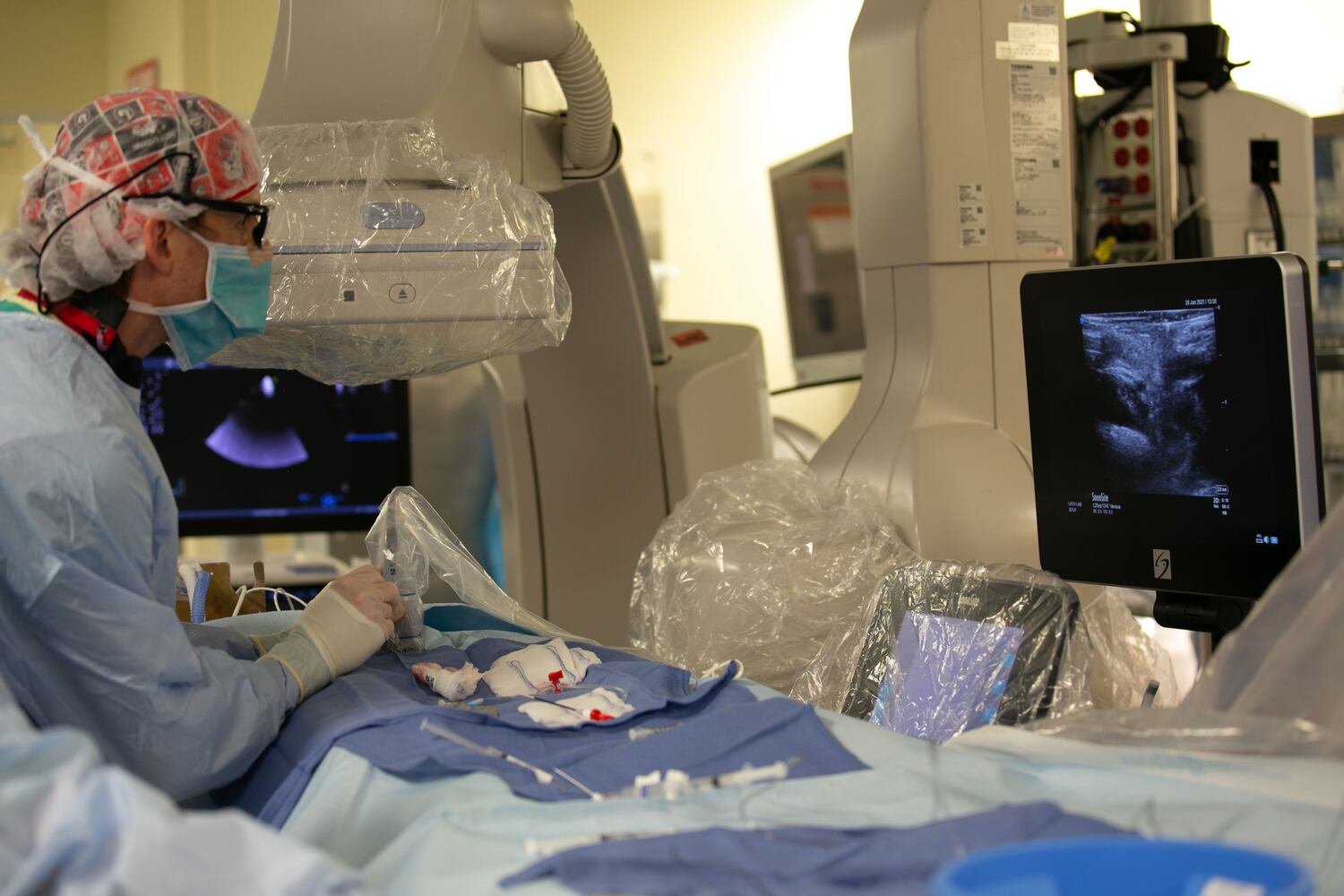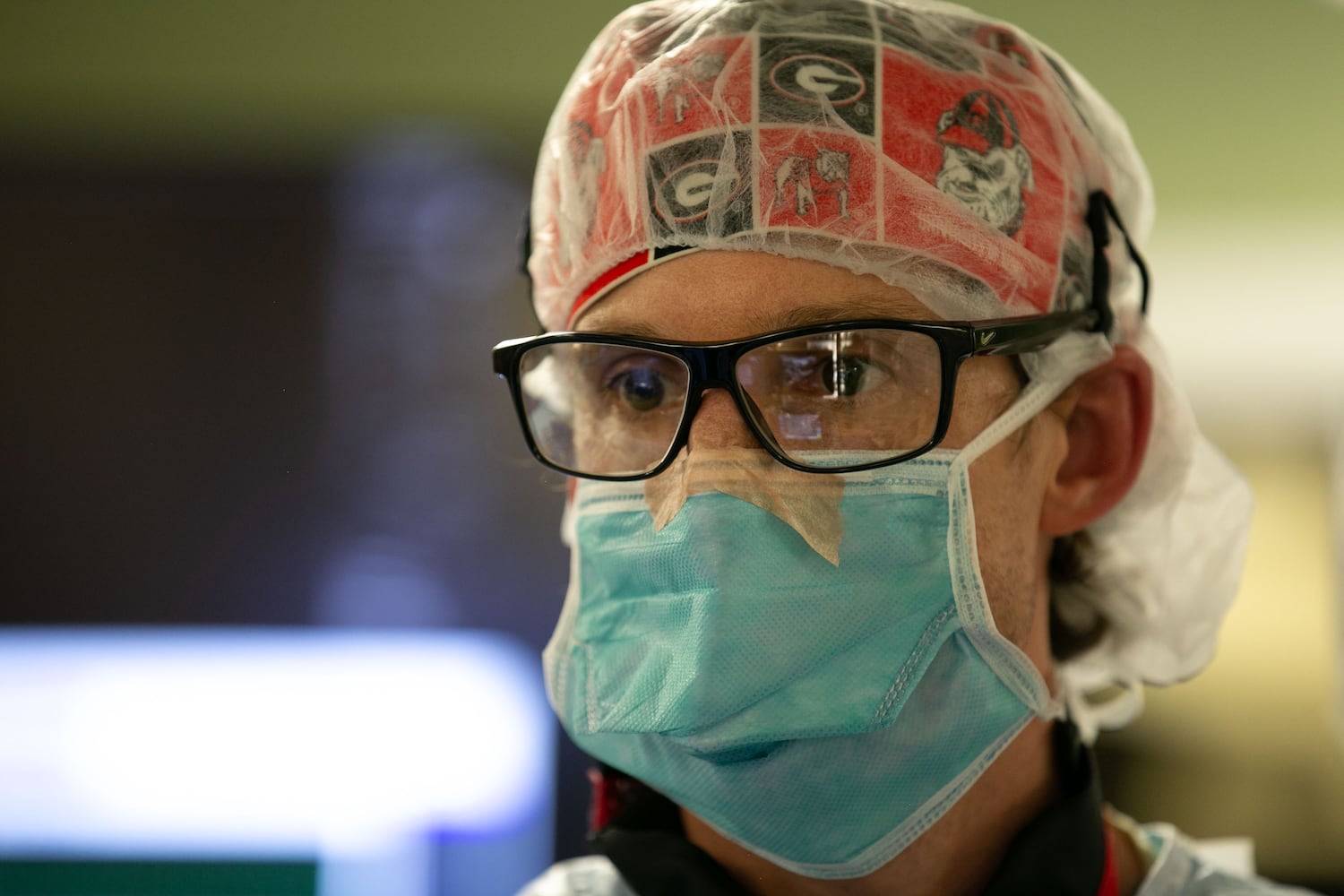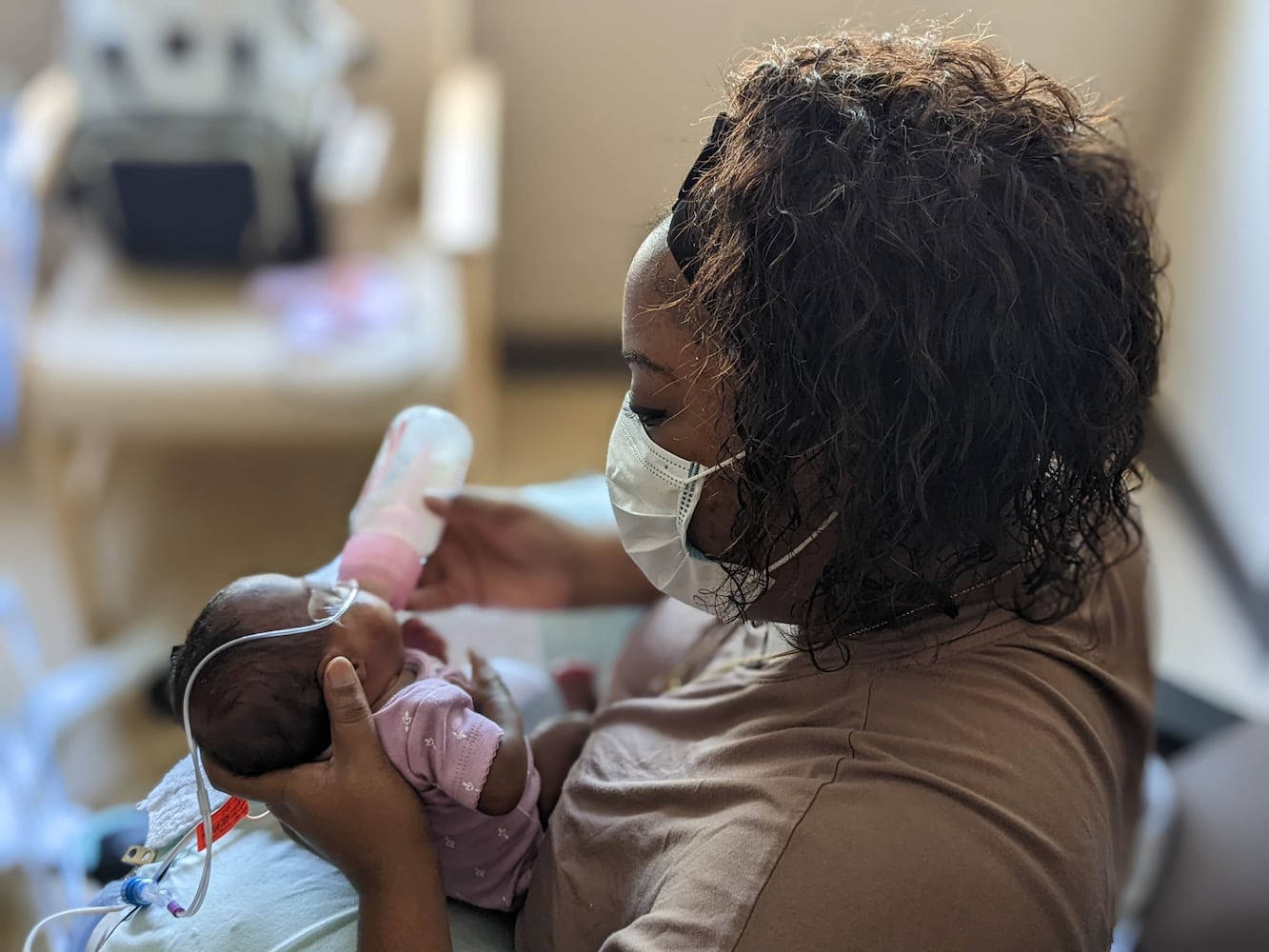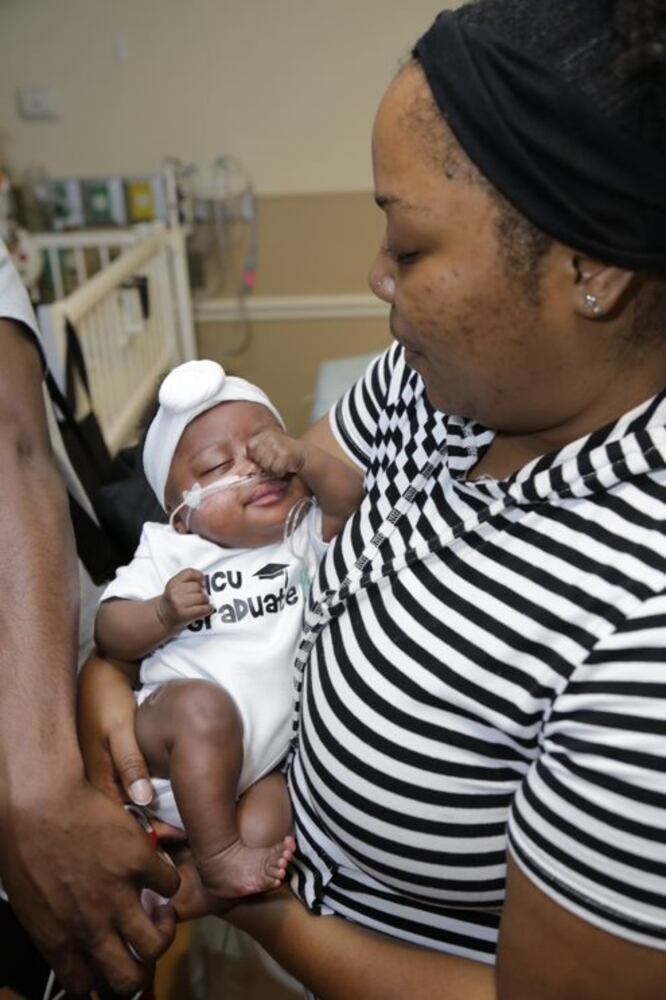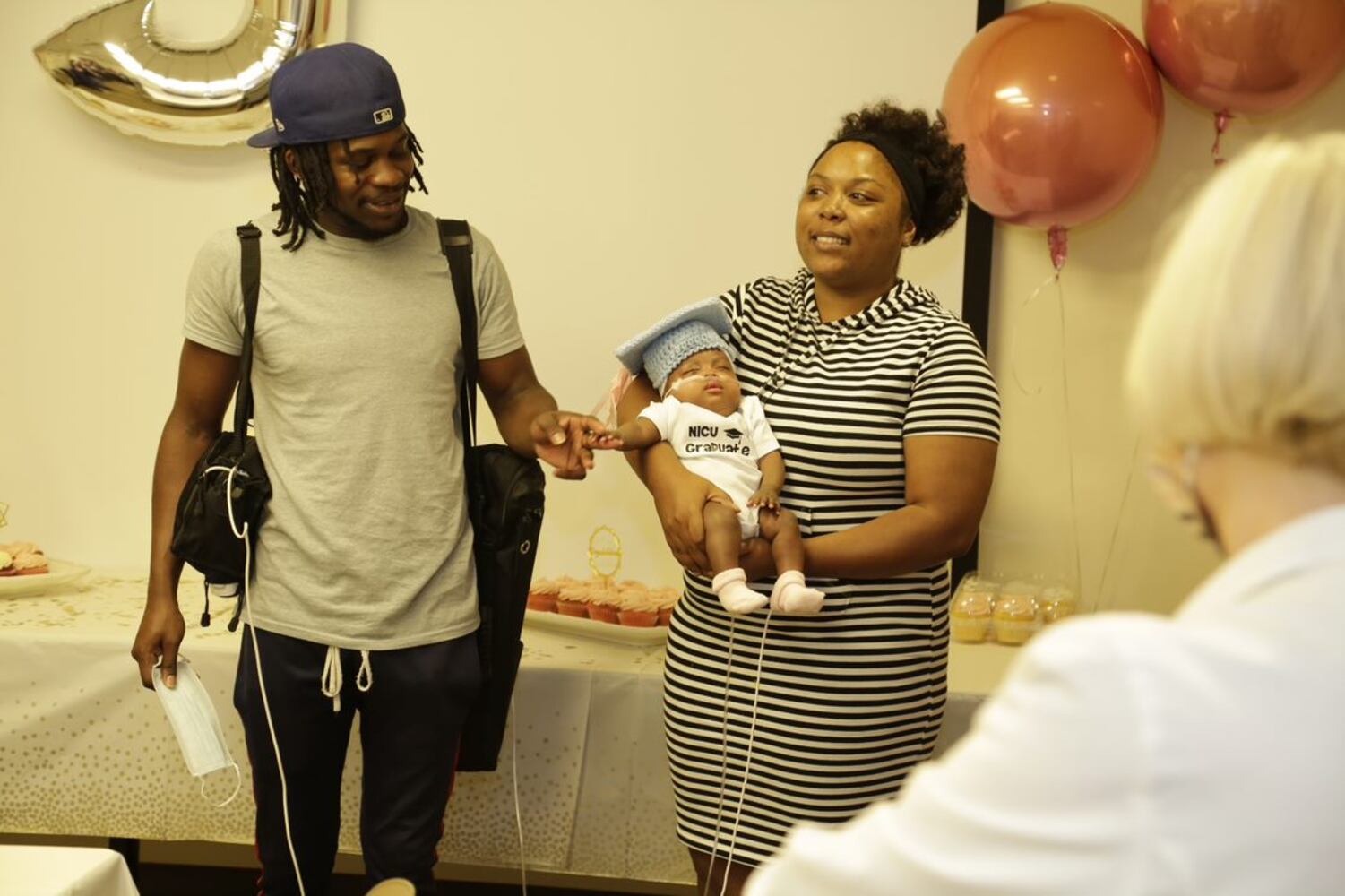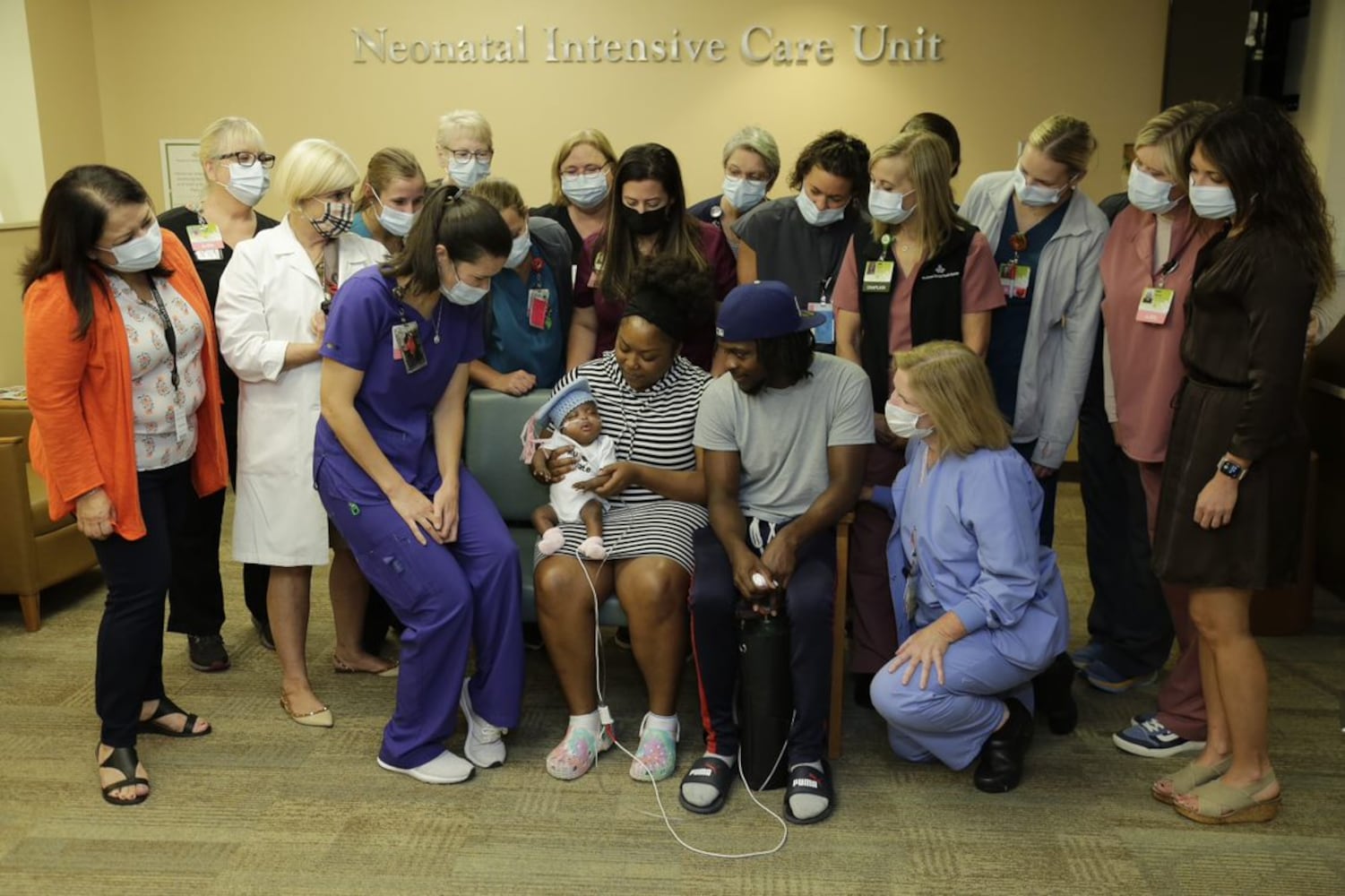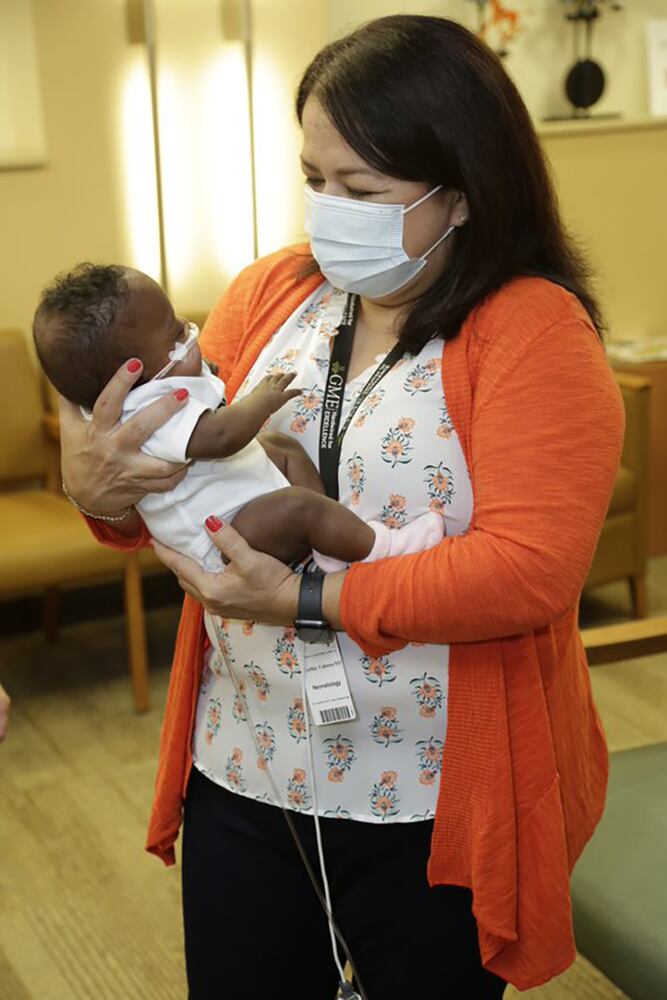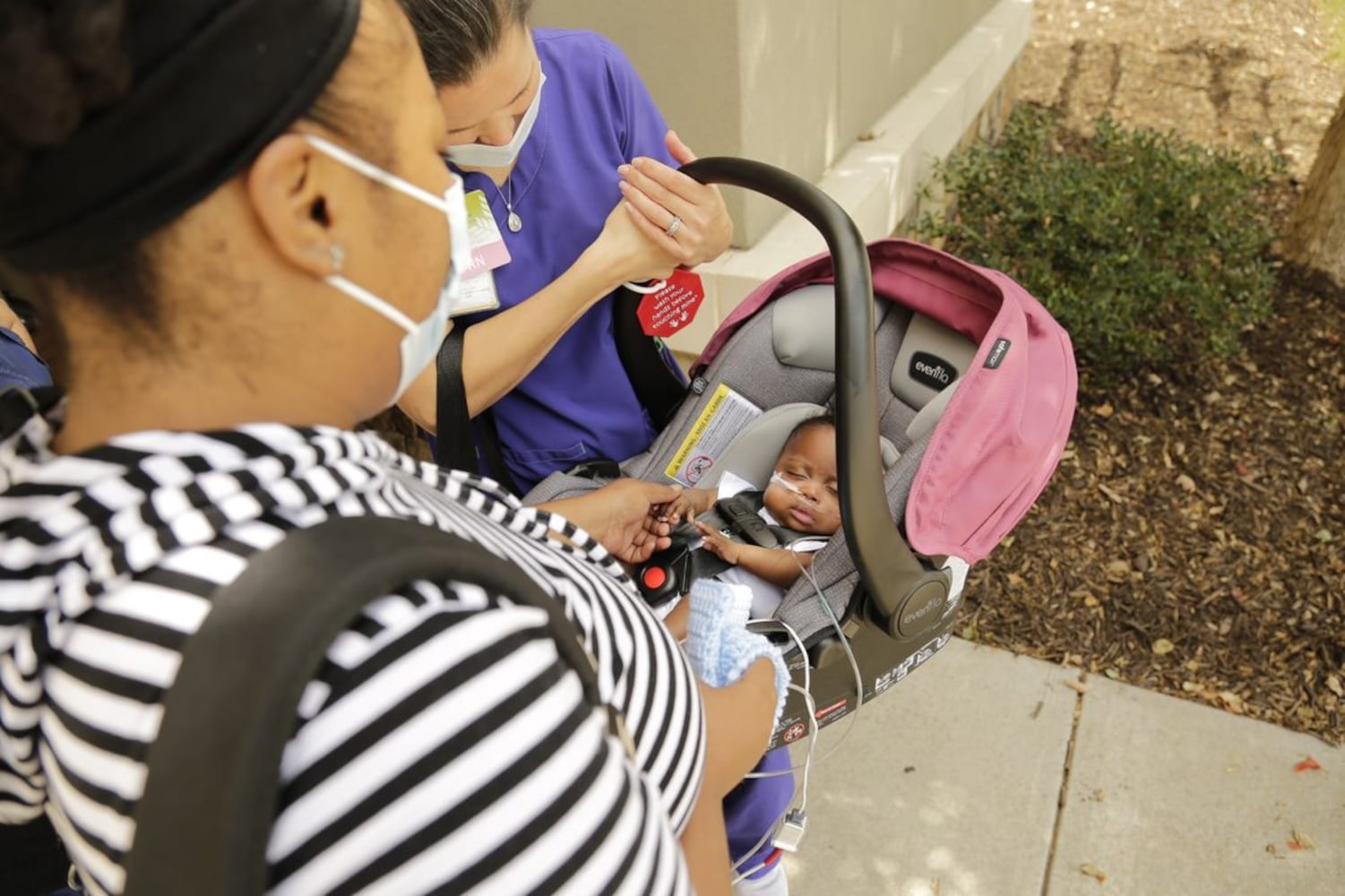The first wave of abdominal cramps stirred Audreona Scott awake in the pre-dawn hours. Initially, she didn’t worry.
Just over halfway through her pregnancy with twins, she added to the list of discomforts: the backaches, the heartburn, the occasional bouts of fatigue. This, she assumed, was what they called Braxton Hicks, the normal contractions that many pregnant women experience as their uteruses take practice runs at labor.
But as Scott meandered through her house, the intensity of the contractions grew stronger. It no longer felt normal.
Grabbing only her cell phone and car keys, with no time to call the babies’ father, she drove to a small hospital only about a mile from her home in Winder. Only 22 weeks into her pregnancy, with 18 more to go, Scott was whisked into an ambulance headed toward the larger Northeast Georgia Medical Center in Gainesville.
In the ambulance, her water broke. And the first-time mother realized her babies were coming — and fast.
“It was like I was having an out-of-body experience,” said Scott, who is 31.
A decade ago, doctors would have held little hope for babies born so prematurely. Even now, it’s a dicey situation. The chances of a baby surviving after only 22 weeks of gestation are exceedingly low — by some estimates, only about 28% with active treatment. It had never happened before at Northeast Georgia Medical Center.
Just one week longer inside a mother’s body can make a huge difference. Of babies born 23 weeks into a pregnancy, 55% survived.
The hospital staff at Northeast Georgia Medical Center, alerted that EMTs were enroute with Scott, scrambled to pull together equipment. They knew what they needed to do: create a womb, or as close to it as they could get, using artificial means.
‘It happened so quickly’
Dr. Cynthia Cabrera, the medical director for the neonatal intensive care unit, received the urgent call on the morning of March 17. The EMTs described the situation: A woman had delivered an extremely premature baby boy in an ambulance. He wasn’t going to make it. But there was another baby on her way out. They thought there might be just enough time to get the mother to the delivery room.
Babies born so prematurely, before 26 weeks of gestation, are not just tiny versions of babies that go full term.
Micro preemies’ organs are not ready to function outside the womb. At 22 weeks, their eyes are sealed shut. The skin is transparent and as delicate as a burn victim’s. They can’t breathe on their own. Caring for them requires tiny tools, specialized staff and constant monitoring. As many as two-thirds of babies will go on to experience serious problems, including blindness and severe intellectual disability.
Not long ago, it would have been almost unheard of to try to save a baby born only 22 weeks into gestation.
But there have been major strides recently, improving the outlook for the tiniest of babies. Surfactant, a mix of protein and fat, aids lung development. Newer ventilators send tiny, rapid puffs into their little bodies. The tools available to create a womb-like environment are better.
Credit: cust
Credit: cust
As fate would have it, just a few days earlier, Cabrera had listened intently to a podcast with Dr. Edward Bell of the University of Iowa Stead Family Children’s Hospital. The hospital has been a pioneer in devising new ways to keep the most fragile babies alive and to help prevent complications.
Cabrera came away from the podcast amazed and inspired. Then Scott was wheeled into her hospital on a stretcher.
“I did not have time to talk to her before the delivery,” said Cabrera.
“It’s something we usually do when mothers are going to have premature births, to talk to them about expectations,” Cabrera said. “We didn’t know how big the baby was going to be or whether we would have the equipment needed for her. But this happened so quickly. The baby was born, and she was here.”
‘Every day was a day gained’
Surrounded by a team of doctors and nurses, Jayla Nicole Jenkins burst into this world, her itty-bitty legs kicking, and arms flapping. She weighed 14.6 ounces, less than a loaf of bread, and stretched only 10.63 inches, small enough to almost fit in the palm of a hand.
Dr. Brenda Poindexter, chief of the division of neonatology at Children’s Healthcare of Atlanta and Emory University, said the hospitals she oversees, including Emory Midtown and Grady Memorial, are open to resuscitating a baby born so early if that’s what the parents want. But, she said, “that doesn’t mean we strongly recommend it, and that’s an important distinction.”
It’s not about just surviving, Poindexter said. It’s about quality of life.
Credit: arvin.temkar@ajc.com
Credit: arvin.temkar@ajc.com
Ideally, she said this difficult decision as to whether the baby should undergo intensive lifesaving attempts should be made by parents and their obstetrician, in collaboration with a neonatologist, and should take into consideration not only estimated gestational age but also other factors including the birthweight of the baby.
“Sometimes, the babies are so small, our breathing tubes are too large to fit their airway,” Poindexter said, “So, sometimes, even if we wanted to, we don’t have the ability to provide support.”
At Northeast Georgia Medical Center, Scott was clear in her desires.
“I don’t care what the outcome is going to be,” she cried out. “I want to do everything possible to save my baby.”
The challenges were numerous. Jayla’s shiny skin was so thin that it was translucent. Cabrera and her team turned to a technique used around the globe to keep extremely premature babies warm — they put Jayla’s body in a plastic bag, similar to a grocery bag, with her head sticking out. She was then placed on a heating pad.
Jayla also needed to be intubated. The hospital staff didn’t even know if the smallest breathing tube, 2 millimeters in diameter, was going to be small enough. It was, but barely.
“I don't care what the outcome is going to be. I want to do everything possible to save my baby."
Jayla was then placed in a baby incubator, a controlled, enclosed environment designed to create conditions similar to the womb. The lights were dimmed, the noise levels kept low. Doctors and nurses had to be careful touching Jayla. Simply holding the tiny baby carried the risk of her bones breaking.
They needed to place sensors on Jayla’s body to monitor her vital signs. But her skin was so fragile that they worried the sticky sensors could tear away the skin when changed or removed. Because she was so little, the monitors couldn’t be placed all over her body, only on one foot or arm.
“We didn’t know for weeks if she was going to survive,” Cabrera said. “Every day was a day gained. We tell parents to take things one day at a time. We were taking it one day at a time, too.”
Credit: cus
Credit: cus
‘She was struggling’
Sarah Taylor, a NICU nurse, said it felt at times like they were handling nitroglycerin, having to be ever so careful with every step, from opening the port to Jayla’s incubator to quietly opening and closing the door to the hospital room.
Scott felt hopeful and optimistic from the moment Jayla entered this world — kicking and turning her little body.
“I felt like she had life in her to live,” said Scott. “I thought there was no way a baby this feisty wasn’t going to make it.”
Every day, Scott spent hours next to Jayla’s incubator, in a cream-colored hospital room they had all to themselves. Dimly lit, with the shades drawn, it was quiet except for the humming and beeping of machines.
Jayla’s father, Raekwon Jenkins, also visited regularly and provided support. They spoke to Jayla in almost a whisper and read her books like “Small but Mighty.”
“I love you,” Scott told her baby over and over. “You are going to pull through.”
Taylor gave Scott a small cloth heart to press against her chest then place in the incubator, close to Jayla’s nose. She wanted the baby to know her mother’s scent.
Meanwhile, one of Cabrera’s biggest concerns was that Jayla would develop a brain bleed. Bleeding can occur because blood vessels in a premature baby’s brain easily rupture. Bleeds can result in long-term brain injury.
“I felt like she had life in her to live. I thought there was no way a baby this feisty wasn't going to make it."
Doctors also became increasingly worried about an opening between Jayla’s aorta and pulmonary artery. All babies are born with this opening in their heart, but it usually closes on its own shortly after birth.
But Jayla’s was large and considered dangerous because the opening can allow poorly oxygenated blood to flow in the wrong direction, weakening the heart muscle and causing heart failure and other complications.
To address that condition, Jayla was transferred to Children’s Healthcare of Atlanta on April 8.
“She was struggling,” said Dr. Allen Ligon, a cardiologist at Children’s Healthcare. “Not just from a lung aspect but also from a heart aspect. Time was of the essence.”
It was doubtful that Jayla would have any chance of surviving major surgery. Ligon and his team decided Jayla was a good candidate for a new kind of procedure to close the heart. A cork-like device is routed through a vein in the baby’s leg to the precise location of the heart. The device used in the procedure was approved by the Food and Drug Administration only three years ago. At the time when Jayla arrived, the procedure had never been done in the U.S. on a baby that small.
Credit: cus
Credit: cus
Ligon sat down with Jayla’s mom and spoke at length.
“I really connected with her,” Ligon said of Scott. “I was very open and honest with her. We would never recommend something we felt the risks outweighed the benefits. But Jayla was so sick at the time, there was a high percentage of risk associated with the procedure, but also of not doing anything.”
The procedure requires incredible precision. Ultrasound imaging was used to ensure the device was in the proper position in the heart. Most newborn hearts are about the size of a walnut. Jayla’s was the size of a piece of Skittle candy. The device was smaller than a small pea.
Not only that, but doctors worried that Jayla would struggle being out of her warm isolette. She could die if she got too cold. So, the team of doctors needed to be precise but fast. They finished the procedure in about 40 minutes. Then Ligon made a beeline for Scott.
‘The first thing I said was ‘She’s OK.’ I wanted her to hear that first,” he said. “Her trust in me, it was an honor, and that is something that is never lost on me. There was a lot of emotion there. We knew it might not end like that.”
Credit: cus
Credit: cus
Immediately, Jayla’s blood pressure improved. Though still in need of respiratory support, she was getting better.
“Even within 24 hours, she was a significantly different child to what she had been pre-procedure,” Ligon said.
Four days later, on Easter, Scott held Jayla for the very first time. Though she couldn’t really see her baby’s face because of the attached equipment and monitors, she was able to feel her warmth. And Jayla could listen to her mother’s heartbeat.
Credit: cust
Credit: cust
‘The next 22-weeker’
Scott and baby Jayla returned to Northeast Georgia Medical Center the following day. Every day, little by little, Jayla continued to improve and to wean off medications and machines while avoiding major complications. Though she had a brain bleed, it was minimal.
On Sept. 16, after 183 days in the NICU, Jayla was released from the hospital.
Cuddled at home by her parents, she loves the sounds of her baby mobile and listening to Mozart. She perks up when her parents read to her. Now weighing over 10 pounds, she’s babbling and close to rolling over.
“I felt like the whole journey was not just about me,” said Scott. “I felt like I needed to go through this to help someone else, the next 22-weeker.”
While Jayla’s future is uncertain she has already defied staggering odds.
“Of course, we are very proud of our team,” Cabrera said. “But, of course, it makes us a little wary. Not all babies (this premature) will have this outcome. Will we be able to do it again? It’s a challenge, but a challenge we are willing to take.”
Credit: arvin.temkar@ajc.com
Credit: arvin.temkar@ajc.com
Credit: arvin.temkar@ajc.com
Credit: arvin.temkar@ajc.com
About the Author
Keep Reading
The Latest
Featured
